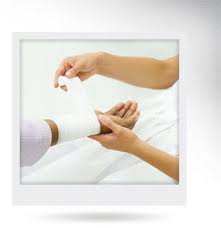| A | B |
|---|
first aid,  | the immediate, temporary care given to an ill or injured person until professional medical care can be provided. |
| emergency survival kit | a set of items you will need in an emergency situation |
| universal precautions | steps takes to prevent the spread of disease through blood and other body fluids when providing first aid or health care |
| chain of survival | a sequence of actions that maximize the victim's chances of survival |
| defibrillator | a device that delivers an electric shock to the heart to restore its normal rhythm |
| CPR | first-aid procedure that combines rescue breathing and chest compressions to supply oxygen to the body until normal body functions can resume |
| rescue breathing | breathing for a person who is not breathing on his or her own. |
| shock | a life-threatening condition in which the heart is not delivering an adequate supply of blood to the body |
| fracture | a break in the bone |
| dislocation | a separation of a bone from its normal position in a joint |
| unconsciousness | condition of not being alert or aware of your surroundings |
| concussion | a jarring injury to the brain that can cause unconsciousness |
| poison | any substance that causes injury, illness, or death when it enters the body. |
| poison control center | 24 hour service that provides emergency medical advice on how to treat victims of poisoning |
| venom | a poisonous secretion |
| hurricane | a powerful storm that generally forms in tropical areas, producing winds of at least 74 miles per hour |
| tornado | a whirling, funnel-shaped windstorm that causes destruction as it advances along the ground in a narrow path |
blizzard,  | a snowstorm with winds that reach 35 miles an hour or more |
| flash floods | floods in which a dangerous volume of water builds up in a short time |
| earthquake | a series of vibrations in the earth caused by a sudden movement of the earth's crust |
| Good Samaritan Laws | statutes that protect rescuers from being sued for giving emergency care |